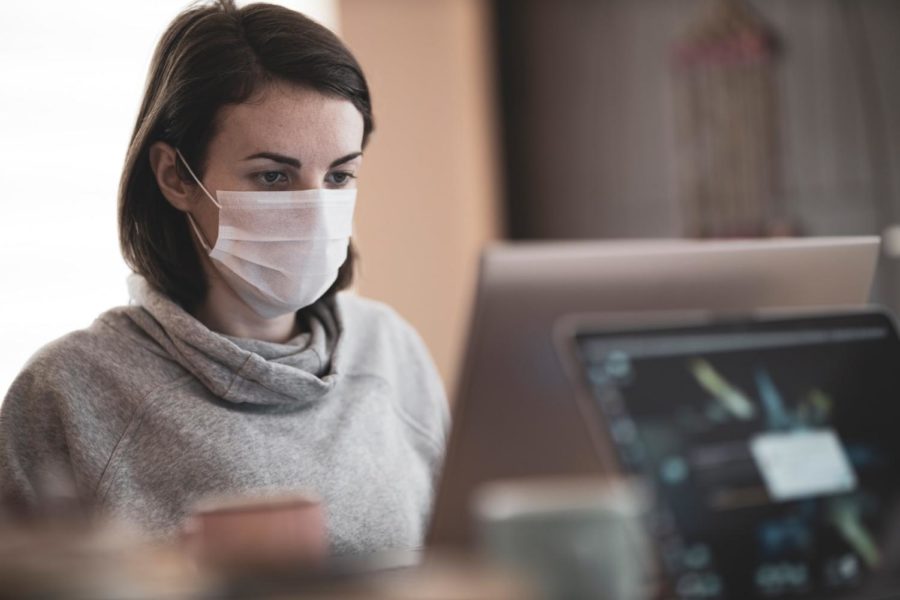Bekkerus: If you say it, mean it
November 7, 2021
This semester, as fewer students are wearing masks, colder weather is approaching and everyone’s starting to get sick more often, I’m thinking about my experience with sickness, mental health and academia. All too often, the university and professors claim that students’ physical and mental health is important, but this is contradicted with nearly every policy put in place.
So far, I’ve seen several university-wide announcements on protecting both our physical and mental health, each with a title such as “Protect your friends and family” or “It’s OK to not be OK.” These usually provide resources for mental and physical health, but oftentimes, it feels performative because of the actual systems in place within our university.
In a perfect world, people would believe the science behind masking and vaccines instead of spreading dangerous narratives, such as that vaccines undermine masking. But this isn’t a perfect world, and we can’t enforce vaccines or masks. But even with these limitations, the university has not made things any easier on us.
This fall, professors have returned to pre-COVID attendance policies with a few exceptions. These exceptions allow for a bit of flexibility concerning positive COVID tests, but it ignores almost everything else. Strep, colds and the flu are all going around. So, if you’re a student, what do you do if you’re sick? Well, first, you check the syllabus for an attendance policy. Some attendance policies are more flexible than others, but they’re still not perfect.
Some professors still require doctor’s notes, an entirely classist policy, especially since Thielen Student Health Center does not hand out notes to miss class, even though your professor may require it. Doctor’s notes are not always a solution — you don’t need a doctor’s note for a cold or a stomach bug, but you also don’t want to be coughing or sick in front of all your classmates who are trying to learn. So, you’re caught — do you go to class sick, or do you face negative consequences? It’s a lose-lose situation.
Too often, professors are worried about students taking advantage of their attendance policy, but to me, this argument isn’t even logical. Missing class is so much more stressful than just going to class in the first place because of the information and assignments you miss, especially since about 90 percent of the time, you won’t get an extension unless you have a very kind professor. If someone is “abusing” your forgiveness, maybe instead of assuming the worst of someone, we should show empathy: there may be something going on behind the scenes we don’t know about.
Naturally, this leads us into mental health. I am someone who struggles with several diagnosed mental illnesses, but because the pain isn’t physical or visible, it somehow doesn’t “count” to many people. And even if you manage to get a day off, the use of Zoom and other communication platforms — despite their overall importance to society now — has ruined one of our final ways of escaping the stress of life and taking time for self-care. Instead of getting much-needed rest when you’re sick or unwell, you’re still in class, still in meetings and still working for the whole day anyway.
Sometimes it seems like things have gotten better in terms of respecting sickness and attendance. In my own classes, my professors have told my classmates and me that they respect us, care about our well-being and that they understand that we will be sick. So why are we still requiring doctor’s notes? Why are we still ignoring the stigma around mental health and taking days off when we really, really need them? Why am I still losing points for (inevitably) missing class?
I’ve had a good amount of professors whose attendance policies have saved both my physical and mental health. I’ve also had professors who have ruined it. But what’s worse than a strict professor who knows they are strict is a professor telling us that our health matters and then contradicting themselves. Students are not robots. If you’re going to say our health matters, then you have to mean it.
As a student, I feel like I’m not allowed to be sick. I feel like I’m not allowed to take care of my mental health. I’m not allowed to take care of myself without fear of repercussions. If we’re going to say “Cyclones Care,” we need to mean it. My own health will always take precedence in my life, and I encourage you to not only do the same but to also hold empathy in your heart for others who need it.

















